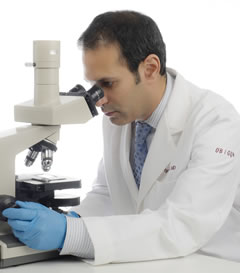Conditions We Treat
Lichen Sclerosus (LS)
Lichen Sclerosus (LS) is a skin disorder that occurs primarily in a female's anogenital area. The skin thins, whitens, wrinkles, and itches. While it can occur at any age, LS most often affects prepubescent girls and postmenopausal women.
Itching will probably be the first sign that something is wrong. As the condition progresses, the skin may crack, bleed easily, and become sore. LS can also cause the genital lips (labia) to thicken and the opening of the vagina to narrow. In an advanced stage of the condition, intercourse is painful.
It is unclear what causes LS. It is not contagious, and no infectious agent has been associated with it. Among the factors that are suspected to play a role, two seem most likely. One is a genetic predisposition, since LS is more common in some families. The other is an immune system dysfunction, since females with LS are also more likely to develop other autoimmune disorders, such as thyroid disease, anemia, diabetes mellitus, vitiligo, and alopecia areata. Other potential causes of LS include skin damaged or scarred from a previous injury, as well as local (still to be discovered) anogenital factors which enable the condition to express itself.
If the vaginitis specialist suspects LS from observations during a physical exam, a small piece of affected tissue may be removed (a biopsy) for analysis at a pathology lab.
Treatment for LS involves steroid ointments which are prescribed to decrease inflammation and itching. Once the acute flare-up is controlled, a maintenance regimen of topical steroid ointment is prescribed to help prevent a recurrence of symptoms. If pain persists despite treatment with steroids, a very low dose of oral or topical antidepressant can help reduce the perception of pain. Occasionally, minor surgery is recommended in advanced cases to alleviate pain and discomfort cased by scarring.
Medications will stop symptoms and prevent the LS from worsening, but they can't reverse whatever scarring of tissue has already occurred. Management of the condition requires emotional support and also education about how to achieve good hygiene of the anogenital area.
Females with LS have a slightly elevated risk of developing squamous cell skin cancer. For this reason, they should examine themselves regularly for lumps or sores that do not heal, and be checked by their doctors every 6 to 12 months.
For more information, see www.lichensclerosus.org.

